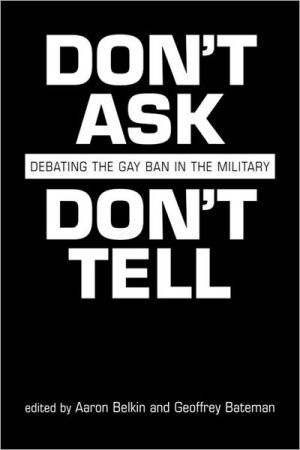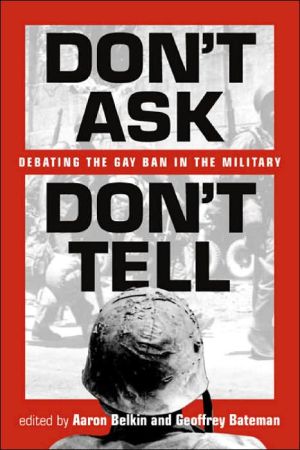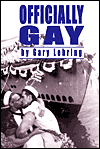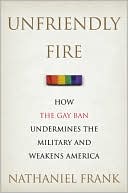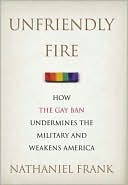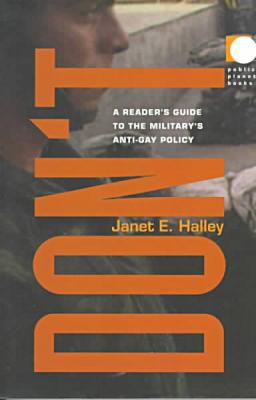Don't Ask, Don't Tell: Debating the Gay Ban in the U. S. Military
Eight essays examine the American military's policy concerning homosexuality. Reflecting both liberal and conservative perspectives, the book offers an historical review of the role of gays and lesbians in the armed forces, and considers issues like privacy, unit cohesion, the hidden costs of the "Don't Ask, Don't Tell" policy, and prospects for the future. One chapter is devoted to recounting the experiences of openly gay soldiers, and another considers the examples of foreign militaries....
Search in google:
Eight essays examine the American military's policy concerning homosexuality. Reflecting both liberal and conservative perspectives, the book offers an historical review of the role of gays and lesbians in the armed forces, and considers issues like privacy, unit cohesion, the hidden costs of the "Don't Ask, Don't Tell" policy, and prospects for the future. One chapter is devoted to recounting the experiences of openly gay soldiers, and another considers the examples of foreign militaries. Annotation (c)2003 Book News, Inc., Portland, OR Library Journal Though it may seem like yesterday's news, the issue of "gays in the military" continues to be played out. The Pentagon's "stop loss" order after 9/11 means that the "don't ask, don't tell" policy of 1993 is in abeyance even though there have been some high-profile dismissals. Both of these books cover much the same ground. Both give excellent introductions to the history of U.S. military policy toward gays, and both provide detailed analyses of the flaws of the policy and are aimed at academic readers. Don't Ask, Don't Tell is the result of a symposium held in December 2000 at the Center for the Study of Sexual Minorities in the Military at the University of California, Santa Barbara, where Belkin and Bateman are director and assistant director, respectively. The text, which is mostly given to transcripts of sessions from the conference, raises the main issues provoked by the policy, such as a soldier's privacy, group cohesion, and the relevance of foreign experiences. Position papers are followed by discussion. Surprisingly, given the format, the process is quite focused. The editors acknowledge their failure in attracting proponents of the ban, though they tried hard to do so. Officially Gay is less policy oriented. Instead, it places military policy in the broader context of culture, using cultural theory to analyze how the policy contradicts itself. More importantly, it shows how the military has varied its stance according to circumstances and used identity as its organizing principle, neglecting distinctions between sexual actions and sexual identities. In this way, Lehring (government, Smith Coll.) makes concrete the essentialist/constructionist debates, which often get obscured by dense theory. Both books belong in academic libraries where there is interest in military affairs.-David Azzolina, Univ. of Pennsylvania Libs., Philadelphia Copyright 2003 Reed Business Information.
Preface1Introduction12History Repeating Itself: A Historical Overview of Gay Men and Lesbians in the Military Before "Don't Ask, Don't Tell,"93Does the Gay Ban Preserve Soldiers' Privacy?514Does "Don't Ask, Don't Tell" Preserve Unit Cohesion?695Are Foreign Military Experiences Relevant to the United States?1036What Does "Don't Ask, Don't Tell" Cost?1397Openly Gay Service Members Tell Their Stories: Steve May and Rob Nunn1578What Have We Learned? The Future of "Don't Ask, Don't Tell"167AppThe "Don't Ask, Don't Tell" Law177Selected Bibliography183The Contributors187Index193About the Book201
\ Library JournalThough it may seem like yesterday's news, the issue of "gays in the military" continues to be played out. The Pentagon's "stop loss" order after 9/11 means that the "don't ask, don't tell" policy of 1993 is in abeyance even though there have been some high-profile dismissals. Both of these books cover much the same ground. Both give excellent introductions to the history of U.S. military policy toward gays, and both provide detailed analyses of the flaws of the policy and are aimed at academic readers. Don't Ask, Don't Tell is the result of a symposium held in December 2000 at the Center for the Study of Sexual Minorities in the Military at the University of California, Santa Barbara, where Belkin and Bateman are director and assistant director, respectively. The text, which is mostly given to transcripts of sessions from the conference, raises the main issues provoked by the policy, such as a soldier's privacy, group cohesion, and the relevance of foreign experiences. Position papers are followed by discussion. Surprisingly, given the format, the process is quite focused. The editors acknowledge their failure in attracting proponents of the ban, though they tried hard to do so. Officially Gay is less policy oriented. Instead, it places military policy in the broader context of culture, using cultural theory to analyze how the policy contradicts itself. More importantly, it shows how the military has varied its stance according to circumstances and used identity as its organizing principle, neglecting distinctions between sexual actions and sexual identities. In this way, Lehring (government, Smith Coll.) makes concrete the essentialist/constructionist debates, which often get obscured by dense theory. Both books belong in academic libraries where there is interest in military affairs.-David Azzolina, Univ. of Pennsylvania Libs., Philadelphia Copyright 2003 Reed Business Information.\ \
